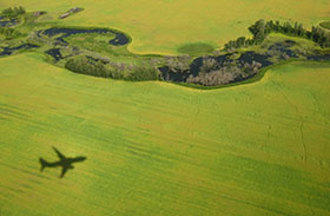
Berlin – The International Air Transport Association (IATA) called on governments in Europe to seize the opportunity to create a sustainable aviation industry that protects the environment and increases connectivity opportunities for Europe's citizens.
The call came at the opening of Wings of Change Europe—a gathering of aviation stakeholders being hosted in Berlin, Germany. Amid continuing celebrations of the 30th anniversary of the fall of the Berlin Wall, the role of aviation in the continent's integration was top of mind.
"Air transport has been at the heart of European integration. Europe is now connected by 23,400 daily flights, carrying one billion people a year. And the same spirit of optimism that forged the new Europe 30 years ago should be turned towards conquering the challenge of sustainability in a positive way. Solutions exist to sustainably connect this continent and keep it accessible to all its citizens," said Alexandre de Juniac, IATA's Director General and CEO.
Focus on environmental action
The growing concerns over climate change has rightly focused attention on the work aviation is doing to reduce emissions. Airlines have cut average emissions per passenger journey in half compared to 1990. More importantly, the industry is committed to reducing its environmental impact even further.
- Airlines continue to invest tens of billions of euros into more efficient aircraft, more efficient operations, and the development of sustainable aviation fuels
- The growth in CO2 emissions from 2020 will be offset using the Carbon Offsetting and Reduction Scheme for International Aviation (CORSIA)
- Aviation has committed to reduce total emissions to half the 2005 level by 2050, in line with the goals of the Paris climate agreement.
Taxation does not solve the climate problem
The climate challenge can only be overcome by industry and governments working together. Governments have the power to accelerate carbon reductions by encouraging investment in sustainable fuels, new technologies, and improvements to air traffic control.
Unfortunately, European governments are focusing on collecting taxes rather than reducing emissions. The latest proposals in Germany would approximately double the taxation on passengers, making it harder for people on lower incomes to fly.
"Taxation is a crude and inefficient method for covering environmental costs. And it picks a fight with the wrong enemy. The goal must not be to make flying unaffordable. Neither should it be to cripple industry and tourism which creates jobs and drives development. Flying is not the enemy—it is carbon. Government policies should aim to help people fly sustainably," said de Juniac.
A Sustainable industry for all
De Juniac highlighted that the airline industry faces considerable challenges in Europe, due to an infrastructure crisis, high costs, and unhelpful regulations. He highlighted:
- The challenges of the capacity crisis, with airports unable to expand
- Increasing costs, particularly charges by monopolistic airports
- Inefficient airspace management, leading to increased delays and emissions
- Regulations such as EU261 on passenger rights, proposals to eliminate seasonable time changes and pressure to diverge from the Worldwide Slots Guidelines, all of which move the industry in the wrong competitiveness direction
"This shows that—despite the European Aviation Strategy—we still have a lot of work to do to ensure that governments work with the industry in partnership for the greater goal: an efficient and sustainably connected Europe," he said.
A more equal workforce for long-term industry sustainability
The Wings of Change event also saw more than 30 airlines commit to '25by2025', designed to increase female employment at senior and under-represented levels within the industry. Airlines pledging to 25by2025 undertake to increase female representation in these areas to a minimum of 25% or by 25% from current levels, by 2025.
"We welcome the airlines that have committed to the 25by2025 campaign today. This has created huge momentum for this very important issue. We need a skilled, diverse and gender balanced workforce to meet the growing needs of our customers. Our eventual goal is equal gender participation at all levels, and the 25by2025 pledge is the start of our journey on that path," said de Juniac.
Read the full speech
For more information, please contact:
Corporate Communications
Tel: +41 22 770 2967
Email: corpcomms@iata.org
Notes for editors:
- IATA (International Air Transport Association) represents some 290 airlines comprising 82% of global air traffic.
- You can follow us at https://twitter.com/iata for announcements, policy positions, and other useful industry information.
